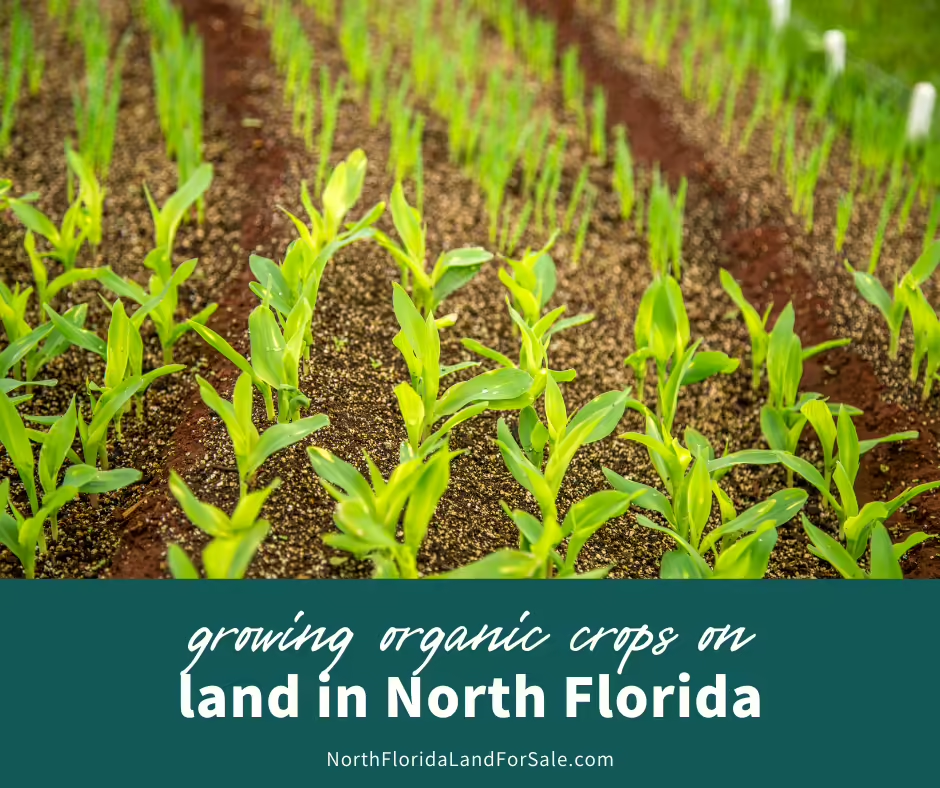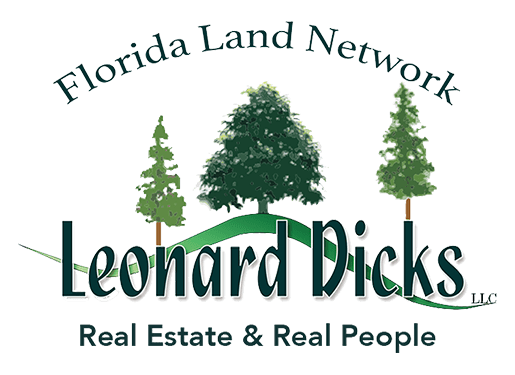
North Florida’s mild climate, fertile soils, and extended growing seasons create ideal conditions for organic farming. With growing interest in sustainable agriculture, many landowners are exploring the potential of North Florida for cultivating organic crops. Here’s why North Florida is perfectly suited for organic farming and how its unique environment supports high-quality, chemical-free crop production.
Year-Round Growing Season
North Florida’s climate offers a nearly year-round growing season, which allows for multiple planting and harvesting cycles annually. This extended season is a major advantage for organic farmers who want to maximize production without relying on synthetic growth stimulants.
- Mild Winters: North Florida experiences mild winters, which means crops can grow continuously or with minimal interruptions. Winter-hardy crops like kale, carrots, and lettuce can thrive even in cooler months, while warm-season crops like tomatoes, peppers, and melons flourish in the longer growing period.
- Reduced Frost Risk: With lower frost frequency than northern regions, North Florida farmers can grow a wider variety of crops without worrying about frost damage. This minimizes the need for greenhouses or protective coverings.
Fertile and Diverse Soil Types
Soil quality is one of the most important factors for successful organic farming, and North Florida’s diverse soil types offer many options for organic crop production. Areas with loamy or sandy soils, such as those found in the Suwannee Valley region, are particularly well-suited for organic farming.
- Nutrient-Rich Soil: North Florida soils, especially those near rivers, are often rich in nutrients essential for healthy crops. The Natural Resources Conservation Service offers soil surveys and maps to help landowners identify areas with high-quality soil for organic agriculture.
- Soil Amendments: Organic farmers can enhance soil quality using natural amendments like compost, manure, and cover crops. North Florida’s soils respond well to organic fertilizers, which improve soil structure, moisture retention, and nutrient availability over time.
Access to Fresh Water Sources
Organic crops often require more precise irrigation methods, as they lack synthetic aids that boost resilience. North Florida’s abundant water resources, including rivers, lakes, and aquifers, provide ample water for irrigation without depleting natural reserves.
- Rainwater Harvesting: North Florida’s annual rainfall makes rainwater harvesting a viable option for organic farmers looking to reduce reliance on groundwater. The Florida Department of Environmental Protection offers guidelines on rainwater harvesting systems that help farmers collect and store water sustainably.
- Well Water Access: For landowners in rural areas, access to groundwater through wells ensures a consistent water supply for irrigation, even during dry periods. Proper well maintenance is crucial to ensure water quality, especially for organic crops sensitive to contaminants.
Natural Pest Control and Biodiversity
A diverse ecosystem supports natural pest control methods, reducing the need for synthetic pesticides. North Florida’s rich biodiversity, from beneficial insects to native plants, provides a balanced environment that supports organic pest management.
- Integrated Pest Management (IPM): Organic farmers in North Florida can implement IPM techniques, using beneficial insects, crop rotation, and companion planting to manage pests. The University of Florida’s Institute of Food and Agricultural Sciences provides resources on IPM and organic-friendly pest control strategies.
- Native Plants as Buffers: Incorporating native plants around organic crop fields can serve as natural buffers, attracting pollinators and predator insects that help manage pest populations naturally.
Ideal Climate for Organic Fertilizers and Composting
North Florida’s warm climate accelerates the composting process, allowing organic farmers to produce nutrient-rich compost faster. Composting is a cornerstone of organic farming, providing a steady supply of natural fertilizer that enriches the soil without synthetic chemicals.
- Rapid Composting Cycles: The region’s warm temperatures allow organic matter to break down quickly, creating high-quality compost within a shorter time frame. This constant supply of compost is invaluable for organic farmers who rely on nutrient-dense soil.
- Vermiculture: Worm composting, or vermiculture, thrives in North Florida’s environment and is an effective way to produce high-nutrient organic matter. Vermiculture is particularly popular among organic farmers, as it adds essential nutrients to the soil while improving structure and water retention.
Supportive Resources and Growing Organic Community
North Florida has a growing community of organic farmers, supported by local markets, extension programs, and agricultural institutions. Access to resources and knowledge-sharing opportunities helps organic farmers adopt best practices and navigate regulatory requirements.
- Extension Services: The University of Florida’s Institute of Food and Agricultural Sciences offers extensive support for organic farming, including workshops, soil testing, and guidance on crop management. These resources provide landowners with science-backed information on organic agriculture tailored to Florida’s environment.
- Local Farmers’ Markets and Co-ops: North Florida’s farmers’ markets and co-ops provide platforms for organic farmers to sell their produce directly to consumers, often at premium prices. These local markets encourage organic production by connecting farmers with buyers who value sustainably grown food.
Health and Environmental Benefits of Organic Farming
Organic farming methods protect both the land and consumers, as they avoid the use of synthetic chemicals that can harm soil and water health. North Florida’s pristine environment benefits from organic practices that enhance biodiversity and reduce pollution.
- Soil Health Preservation: Organic farming improves soil health over time, making it more resilient and productive. Techniques like crop rotation and reduced tillage help maintain soil structure, prevent erosion, and support beneficial microorganisms.
- Water Quality Protection: By avoiding chemical pesticides and fertilizers, organic farming minimizes runoff pollution. This is particularly important in North Florida, where aquifers and waterways support both agriculture and local communities.
Are You Buying a Home or Land for Sale in Lake City?
If you’re moving to Lake City, we can help you find the perfect place to live. Call us at 386-243-0124 to tell us what you want from your home and we will begin searching right away.
Check these out:
- Paved road frontage for sale in Columbia County
- Non-deed-restricted land for sale in Columbia County
- Wooded oak tree land for sale in Columbia County
- Land-for-land home combo in Lake City
- Waterfront residential in Lake City
- Waterfront land in Columbia County
- Bank-owned homes and foreclosure in Columbia County
- Short sales in Columbia County



